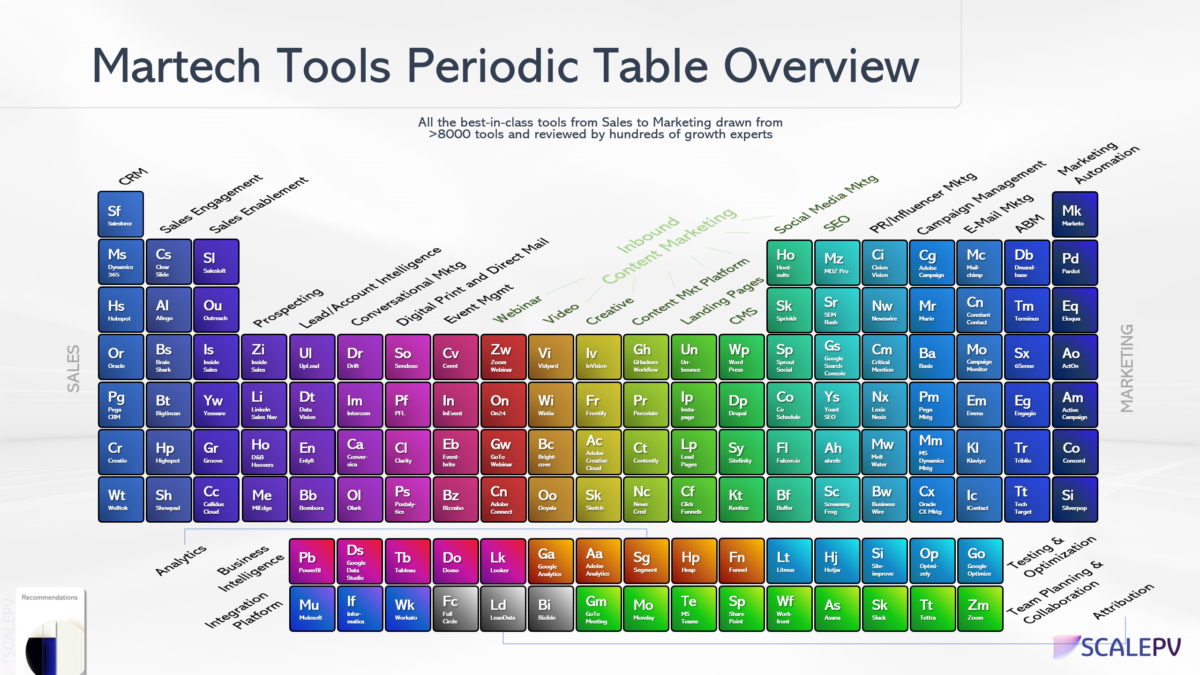What is a marketing technology stack? A marketing technology stack describes the grouping of software and tools that assist an organization in achieving marketing goals or objectives. When a marketing team utilizes a range of different types of these technologies, this is known as their “marketing technology stack.”
This term may be new to some, but it is important for all marketers to understand what it is and how it can benefit their work. Marketing technology stacks can help improve customer acquisition, communications with leads or customers, and collaboration between team members, as well as boost marketing productivity.
In addition, a well-organized marketing technology stack can provide insights into customer behavior that can help inform marketing strategy. By using the right tools and technologies, marketers can more effectively reach their target audiences and achieve their desired results.
Marketing Technology Categories
So, what goes into a marketing technology stack? There are many different types of software and tools that could be included, and for B2B companies it also includes lead generation tools and other sales-based technologies. Here is how we categorize the Marketing Technology Stack tools, from Sales to Marketing:
- CRM
- Sales Engagement
- Sales Enablement
- Prospecting
- Lead/Account Intelligence
- Conversational Marketing
- Digital Print and Direct Mail
- Event Management and Digital Event Production
- Video Management
- Creative Tools and Digital Asset Management
- Content Marketing Platform
- Landing Pages
- Content Management System ( CMS )
- Customer Experience Management
- Social Media Marketing
- SEO and SEM
- PR and Influencer Marketing
- Campaign Management
- E-Mail Marketing
- Account Based Marketing
- Marketing Automation
With these, we also have support tools categories like
- Business Intelligence
- Reporting and Analytics
- Integration Platforms
- Testing and Optimization
- Attribution
- Team Planning and Collaboration
- Billing, Subscription & Licensing

Tools are becoming more integrated with each other and marketing automation tools, for example, are growing to include features like Customer Journey Mapping, Marketing Performance Metrics, etc. A modern Marketing Stack is usually a combination of ‘traditional’ marketing automation tools and others that focus on different aspects of the marketing process or sales process.
With thousands of solutions to choose from it is critical for marketers to understand how the right tech stack affects their business and how technology is fundamental to achieving their goals. If the need is to improve cross-channel personalization and attract more customers at a lower cost, your MarTech needs to go where your marketing strategy wants. The most important thing to consider when making a Martech purchase is that creating a meaningful customer journey does not happen without developing a consistent strategy for CX (Customer Experience).
Marketing Technology Challenges
Implementing, maintaining, and optimizing your organization’s MarTech is not a simple, streamlined process. Rather, organizations need to prepare to overcome a few key challenges before they can fully realize the benefits of marketing technology.
Stack Selection
Choosing the right platform is difficult since scoping tools is normally a choice between picking the best and staying with what fits the current company’s technologies. Integrating new systems often is a challenge, and working with stakeholders to roll out technology can create unexpected hiccups.
Automation
As pointed out at the latest Martech events, businesses need to take a more focused approach to modify their workflows to ensure the satisfaction of business needs from lead generation to customer success. That road is not always easy to understand and automate. A culture of testing and analyzing for automation is crucial to enable services and products to become more personalized and scalable.
Change Management
Changing the way marketing functions can be a game-changer but also a challenge. Working to get staff trained on new platforms and realign workflows provides a hindrance to day-to-day activities. Fortunately, successful adoption of technology with a new data culture usually leads to great results.
Processing Data
Determine what data is and isn’t important can be a sizable challenge for the organization. Capturing, transforming, analyzing, and reporting data to internal and external clients is at the core of the modern marketing function. Selecting the right vendors and working together with data scientists to help analyze the vast amounts of data can help marketing departments sift through the noise.
How Marketing Technology Stack Can Help Marketing Managers?
Marketing teams need to be agile, flexible, and able to adapt quickly while still hitting their goals and maintaining their strong eye on future initiatives. Marketing teams can be oriented around common and easily understood frameworks as the sales funnel, customer journeys, and success metrics.
Applying technology to the business goals and using these frameworks will provide managers with the foundation to build and execute in a cohesive, scalable way. Marketing teams can use this foundation to leverage new and existing tools to create new processes and ways of working quickly and easily.
Conclusion
Marketing technology stacks assemble groups of different applications that work together to execute a marketing strategy. Marketing teams can use this technology stack to choose the best use cases for their business goals and objectives at any particular moment of the customer journey. By choosing these individual technologies carefully, marketing teams can continuously adapt to meet specific needs as they arise.
The Marketing Technology Stack should be a highly dynamic toolset, requiring deep analytical skills so marketers can be aware of changes across all parts of the stack and determine how this will affect future strategies and tactics. Marketing managers need to be able to understand not only what functionalities and capabilities each application provide but also how it fits into the big picture – its stakeholders, current usage trends, etc.
When evaluating how to develop your marketing technology strategy our experts can help, and if you need to get the best out of the technology you already have we can help. Find out more here.
Sources:
https://merlinone.com/what-is-martech/ https://martechpod.com/what-is-martech/ https://www.actioniq.com/blog/what-is-a-martech-stack/ https://digitalcommunicationsgroup.com/article/what-is-a-martechstack/ https://stensul.com/why-martech-leaders-are-struggling-to-take-full-advantage-of-their-martech-stack-a-conversation-with-martech-expert-anita-brearton-part-two/ https://www.intercom.com/blog/the-ultimate-marketing-technology-stack/ https://www.wsiworld.com/blog/foundations-building-marketing-tech-stack https://www.forumone.com/ideas/choosing-the-right-martech-stack-tips-and-tools/ https://www.marketingevolution.com/knowledge-center/how-to-get-the-most-value-out-of-your-martech-stack https://growth-division.com/martech-stacks/ https://www.beargroup.com/ideas/martech/integrated-marketing-tech

